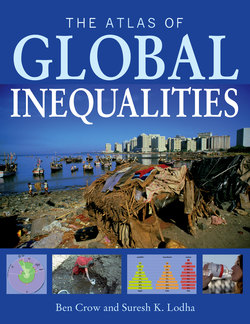Читать книгу The Atlas of Global Inequalities - Ben Crow - Страница 31
На сайте Литреса книга снята с продажи.
ОглавлениеFrom the late 1970s, the rise of neo-liberalism, which seeks to minimize the role of the state and maximize the private business sector, encouraged governments across the globe to privatize state industries and reduce state spending. Healthcare, education and social security were disproportionately cut, while many states protected military spending. These ideas led to widespread austerity. An increase in inequalities followed, with women in many poor households taking on extra work to substitute for lost livelihoods, and to pay for education, health and social support. Social spending is higher in industrial countries than in the developing world, but better basic safety nets could prevent illness and other personal disasters causing a rapid descent into poverty for those living on a financial knife edge.
The proportion of GDP that governments spend on the military, healthcare, education, and social security provides one measure of their social priorities.
40–41 Gender R
31
Copyright © Myriad Editions
